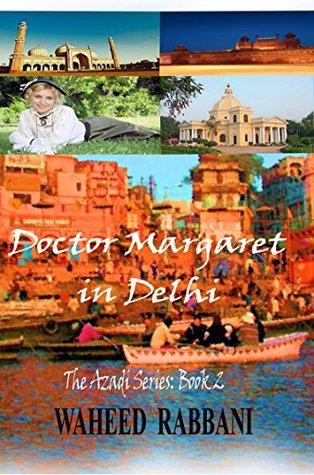The author of this book has kindly offered one e-copy (Kindle or epub) each of ‘Doctor Margaret's Sea Chest’ and ‘Doctor Margaret in Delhi’ - so there will be two lucky readers this time. To be in with a chance to win, just leave a comment below or on our Facebook page.
The draw will be announced about a week after this post.
 |
| Cover image (Goodreads) |
This story is almost entirely set in India of the 1850s. It follows Dr Margaret of the title (Margaret Wallace) as she travels from Calcutta - modern Kolkata - to Delhi, and experiences life in Delhi itself. This part of the book is easily read with no prior knowledge, as the circumstances of Margaret's earlier life are well explained in various stages. However, there is a short frame story set in present-day Canada, and I found this harder to make sense of. I assume that the first story gave some context for the various actions going on there.
But with so much of the story set in mid nineteenth century India, this is where I shall focus. At this time, the British presence in India was changing from its original mercantile base, claimed by the East India company, towards direct rule as a colony, enforced militarily. It was also expanding from a few major entry ports towards assimilating the whole nation. At this time, British leaders were largely acquiring territory by playing off one local ruler against another, and negotiating settlements which appeared fair, but actually favoured British interests and the rapidly growing ambition for empire. India, divided into a dense network of local principalities, alliances, and rivalries, was proving highly vulnerable to this divide-and-conquer strategy, and was beginning, far too late, to realise the inevitable outcome. The political situation leading up to this state of affairs is explained in considerable detail through the book.
 |
| Shipping at Calcutta (Kolkata), 1860s http://www.oldindianphotos.in |
The fascination of the book comes, I think, from its focus. Rather than write an action story describing the military actions of this era, or a political drama looking at the equally fierce deals and betrayals, we are led to walk alongside Margaret as she pursues her own course. With lavish attention to detail of culture, language, custom, religion, food, and so on, the turbulence of the Indian setting is kept for the most part in the background. We have a personal view, not a national one.
 |
| Chandni Chowk from the Palace, Delhi, 1850s http://www.oldindianphotos.in |
This brings me to what I think is a central theme of the story - the playing out of karmic relationships between people, resulting in constant attraction or antipathy. In terms of Margaret's own Christian perspective, this would be described as reaping what you sow. Certainly her consistent and generous actions towards Indian communities, regardless of wealth or poverty, stand her in good stead in her own hour of need. But whatever the underlying explanation, the dogged way in which those who dislike her seek to ruin her life and reputation is a source of constant distress. Perhaps she will find resolution in book 3, but as reader, you will have to wait a while before you can find out about that.
Definitely a book to read if you like to be immersed in the details of a past society. The book is set in a time of major transition for India, but the book focuses away from those, in order to explore the transformation of individual lives.
About the author:
 |
| Waheed Rabbani |
Waheed Rabbani was born in India, near Delhi, and was introduced to Victorian and other English novels, at a very young age, in his father's library. Most of the large number of volumes, had been purchased by his father at 'garage sales' held, by departing British civil service officers and their families, in the last days of the Raj.
Waheed graduated from Loughborough University, Leicestershire, England, and received a Master's degree from Concordia University, Montreal, Canada. While an engineer by profession, Waheed's other love is reading and writing English literature that prompted him to obtain a Certificate in Creative Writing from McMaster University, Hamilton, Canada and embark on his writing journey.
Waheed's historical fiction The Azadi Series, Book I: Doctor Margaret's Sea Chest, and Book II: Doctor Margaret in Delhi, are available at all Amazon, and other Bookstores.
Waheed and his wife, Alexandra, are now settled on the shores of Lake Ontario in the historic town of Grimsby. More information is available on his website: http://home.cogeco.ca/~wrabbani
About the reviewer:
Richard Abbott lives in London, England. He writes science fiction about our solar system in the fairly near future, and also historical fiction set in the ancient Middle East - Egypt, Syria, Canaan and Israel.
When not writing words or computer code, he enjoys spending time with family, walking, and wildlife, ideally combining all three pursuits in the English Lake District. He is the author of In a Milk and Honeyed Land, Scenes From a Life, The Flame Before Us - and most recently Far from the Spaceports. He can be found at his website or blog, on Google+, Goodreads, Facebook and Twitter.

This book sounds really intriguing. Although a far cry from my usual subject of reading, I am tempted by your review Richard.
ReplyDeleteIt sounds really good and very well researched.
ReplyDeleteI look forward to reading it..
Diana
It sounds really good and very well researched.
ReplyDeleteI look forward to reading it..
Diana
Hoping to win a copy!!!
ReplyDeleteSounds fascinating
ReplyDeleteAnd the winners of the two ebooks generously donated by Waheed Rabbani are:
ReplyDelete1 - Dr Margaret's Sea Chest - Louse Rule
2 - Dr Margaret in Delhi - D Arcadian
If yo can let me know by Facebook PM or similar means the email addresses you would like to use I will pass them on to Waheed.